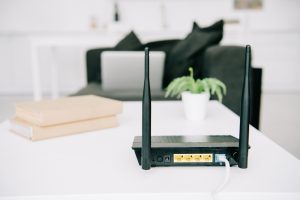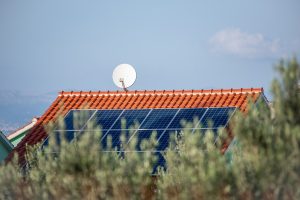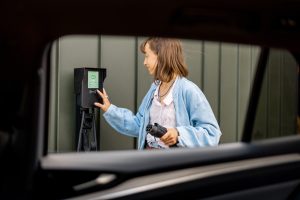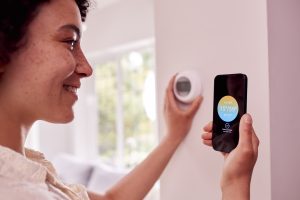The landscape of personal transportation is undergoing a remarkable transformation across the UK. With electric vehicle (EV) sales surging and the government’s 2030 ban on new petrol and diesel cars approaching, many homeowners are considering the practicalities of EV ownership—particularly home charging solutions. At Martin Kaine Electrical, we’ve helped countless clients navigate this new territory. Here’s our comprehensive guide to determining whether a home EV charger is the right choice for your property and lifestyle.
The Growing Case for Home EV Charging
Charging an electric vehicle at home offers significant advantages over relying solely on public infrastructure:
Convenience: Charge your vehicle overnight while you sleep, ensuring it’s ready each morning.
Cost efficiency: Home electricity rates are typically much lower than public charging fees, potentially saving hundreds of pounds annually.
Charging certainty: No need to locate available public chargers or wait for others to finish charging.
Weather protection: Charge comfortably regardless of rain, wind, or cold temperatures.
Property value: Studies suggest homes with EV chargers are becoming increasingly desirable and may command higher prices.
With these benefits in mind, let’s explore the key considerations that will help you determine if home charging is viable for your specific situation.
Essential Considerations Before Installation
Vehicle Compatibility
Not all electric vehicles use the same charging technology:
Connector types: Most UK EVs use Type 2 connectors, but some older models may have Type 1 ports. Ensure your chosen charger matches your vehicle.
Charging speeds: Different EV models accept different maximum charging rates—typically between 3.6kW and 22kW for home charging. There’s no benefit in installing a charger more powerful than your vehicle can utilise.
Battery capacity: Larger-capacity vehicles benefit more from faster chargers, while smaller-battery PHEVs (Plug-in Hybrid Electric Vehicles) may work fine with slower options.
Property Suitability
Your home’s physical characteristics significantly impact charger installation:
Off-street parking: To install a home charger, you’ll generally need dedicated off-street parking—ideally a driveway or garage where your vehicle can be parked close to your property.
Proximity to consumer unit: The distance between your consumer unit (fuseboard) and the proposed charger location affects installation complexity and cost. Installations requiring extensive groundwork or cable routing through multiple walls will be more expensive.
Wi-Fi coverage: Many modern chargers include smart features that require Wi-Fi connectivity. Check signal strength at your proposed installation location.
Cable routing: Consider the aesthetics and practicality of cable routing between your consumer unit and the charger position.
Electrical Infrastructure
Your home’s electrical system must be capable of supporting an EV charger:
Supply capacity: Most UK homes have a single-phase 100A supply, suitable for chargers up to 7.4kW. Three-phase supplies can support faster charging but are uncommon in domestic settings.
Consumer unit capacity: Your fuseboard must have available capacity to accommodate the charger. Older units may need upgrading.
Overall electrical demand: Consider your household’s typical electricity usage. Homes with high-demand appliances like electric showers, cookers, and hot tubs may need load management solutions.
Earthing arrangements: Your property’s earthing system must meet current regulations. Older TT systems may require additional protection.
Our qualified electricians can conduct a thorough assessment of your electrical system to determine its suitability and any necessary upgrades.
Types of Home Chargers Explained
Home EV chargers generally fall into these categories:
By Power Output
3.6kW (16A) chargers: The slowest option, typically charging a standard EV in 10-12 hours. Suitable for overnight charging of smaller batteries or properties with limited electrical capacity.
7.4kW (32A) chargers: The most common home installation, providing a full charge in 5-7 hours for most EVs. Represents the optimal balance between charging speed and installation cost for most UK homes.
22kW (3-phase) chargers: Fast charging option requiring a three-phase supply, uncommon in UK homes but sometimes found in rural properties or newly built houses. Provides full charging in 2-3 hours.
By Feature Set
Basic chargers: Simple plug-and-charge functionality without connectivity features. Most affordable option.
Smart chargers: Connected devices offering app control, charging scheduling, energy monitoring, and integration with home energy systems. All chargers installed under the OZEV grant scheme must have smart functionality.
Solar-compatible chargers: Advanced units that can integrate with solar PV systems, allowing your vehicle to charge using excess solar generation.
Load-balancing chargers: Intelligent systems that can reduce charging speed when other high-demand appliances are in use, preventing supply overload.
Installation Process and Requirements
Installing an EV charger is a job for qualified professionals. The process typically involves:
Pre-Installation
Technical survey: Assessment of your property’s electrical system and the proposed installation location.
Charger selection: Based on your vehicle, property characteristics, and personal preferences.
DNO notification: For chargers above 3.6kW, your Distribution Network Operator must be notified (a service we handle for you).
Installation Day
A typical installation includes:
Consumer unit work: Installing dedicated protection devices and making connections to your electrical supply.
Cable routing: Running suitable cabling from your consumer unit to the charger location, typically in protective conduit.
Charger mounting: Securely fixing the charging unit to your wall or a dedicated post.
Testing and certification: Comprehensive safety testing and provision of necessary certification.
Most installations are completed within a single day, with minimal disruption to your household.
Regulatory Compliance
All home charger installations must comply with:
BS 7671 Wiring Regulations: Standard for electrical installations in the UK.
IET Code of Practice: Specific guidance for EV charging equipment installation.
Building Regulations: Particularly Part P relating to electrical safety in dwellings.
OZEV grant requirements: If claiming government funding, additional technical standards apply.
As NICEIC-registered electricians, Martin Kaine Electrical ensures complete compliance with all relevant standards.
Costs and Financial Considerations
Installation Costs
The total cost of installing a home EV charger typically ranges from £800-£1,500, depending on:
Charger type: Basic units cost less than advanced smart chargers.
Installation complexity: Simple installations cost less than those requiring extensive groundwork or consumer unit upgrades.
Additional features: Options like load management, solar integration, or enhanced connectivity increase costs.
Grants and Incentives
Various schemes have supported home charger installation, including:
OZEV Electric Vehicle Homecharge Scheme (EVHS): Historically provided grants of up to £350 towards installation costs, now focused on rental and leasehold properties.
Energy company offers: Some electricity suppliers offer discounted installation or special EV tariffs.
Vehicle manufacturer incentives: Some car manufacturers provide charger installation as part of vehicle purchase.
Our team stays updated on available incentives and can advise on your eligibility.
Running Costs and Savings
Home charging typically costs 5-15p per mile, compared to:
Public charging: 15-45p per mile Petrol/diesel: 15-25p per mile (at current prices)
For a typical driver covering 8,000 miles annually, this can represent savings of £500-£1,200 per year compared to refuelling with petrol.
Smart Charging and Future Considerations
The latest home chargers offer sophisticated features worth considering:
Energy Management
Time-of-use tariffs: Program charging during off-peak hours (typically midnight to 7am) when electricity costs significantly less.
Solar integration: Charge using excess generation from your solar panels, potentially achieving zero-cost miles.
Home battery systems: Coordinate with home battery storage to optimise energy use and protect against power cuts.
Vehicle-to-Grid/Home Technology
Emerging V2G and V2H technologies allow bidirectional energy flow, enabling your EV to:
Power your home: During power cuts or peak rate periods Sell energy back to the grid: Generating income during high-demand periods Balance renewable energy: Supporting the wider transition to green energy
While still developing, these technologies may influence your charger selection if future-proofing is a priority.
Common Questions and Concerns
“Can I just use a standard socket?”
While possible, regular 13A sockets:
- Charge at only 2.3kW (extremely slow)
- Aren’t designed for the sustained high loads EV charging creates
- Lack important safety features specific to EV charging
- May invalidate some vehicle warranties
For occasional emergency use, standard sockets can work, but they’re not a long-term solution.
“Will charging affect my electricity bill significantly?”
Adding an EV typically increases household electricity consumption by 30-50%. However, this is offset by eliminated fuel costs, and special EV electricity tariffs can significantly reduce the impact.
“What about apartments and shared parking?”
Residents without dedicated parking face greater challenges, but options include:
- Working with property management to install shared chargers
- Utilising workplace charging
- Relying on public infrastructure
- Exploring community charging schemes
“How future-proof are today’s home chargers?”
Quality modern chargers should remain effective for 10+ years. Key future-proofing features include:
- Software updateability
- Open communication protocols
- Flexibility to adjust charging rates
- Compatibility with emerging energy management systems
Making Your Decision
A home EV charger is likely right for you if:
- You have suitable off-street parking
- Your electrical infrastructure can support it (or can be upgraded)
- You drive regularly and would benefit from the convenience
- You’re committed to EV ownership for the medium to long term
Conversely, you might want to postpone installation if:
- You rely primarily on on-street parking
- Your electrical system requires extensive upgrading
- You’re planning significant home renovations in the near future
- You only use your vehicle for very limited journeys
Expert Installation from Martin Kaine Electrical
At Martin Kaine Electrical, we provide end-to-end EV charger solutions, including:
Free initial consultation: Discussing your needs and assessing basic feasibility.
Technical survey: Comprehensive assessment of your property and electrical system.
Personalised recommendations: Selecting the optimal charger for your specific requirements.
Professional installation: Completed by our NICEIC-registered, OZEV-approved installers.
Ongoing support: Assistance with setup, troubleshooting, and future questions.
As electric vehicles become the new standard for UK motorists, home charging represents a significant quality-of-life improvement for owners. Contact Martin Kaine Electrical today to explore whether a home EV charger is right for your property and to begin your journey toward convenient, cost-effective electric vehicle ownership.




